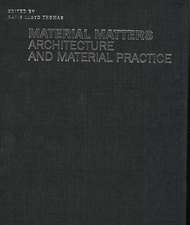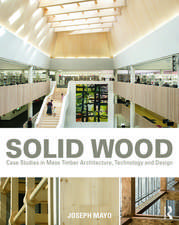The Politics of Parametricism: Digital Technologies in Architecture
Editat de Matthew Poole, Manuel Shvartzbergen Limba Engleză Hardback – 21 oct 2015
| Toate formatele și edițiile | Preț | Express |
|---|---|---|
| Paperback (1) | 200.89 lei 6-8 săpt. | |
| Bloomsbury Publishing – 21 oct 2015 | 200.89 lei 6-8 săpt. | |
| Hardback (1) | 774.62 lei 6-8 săpt. | |
| Bloomsbury Publishing – 21 oct 2015 | 774.62 lei 6-8 săpt. |
Preț: 774.62 lei
Preț vechi: 991.79 lei
-22% Nou
Puncte Express: 1162
Preț estimativ în valută:
148.24€ • 154.57$ • 123.20£
148.24€ • 154.57$ • 123.20£
Carte tipărită la comandă
Livrare economică 20 martie-03 aprilie
Preluare comenzi: 021 569.72.76
Specificații
ISBN-13: 9781472581662
ISBN-10: 1472581660
Pagini: 280
Ilustrații: 45 bw illus
Dimensiuni: 156 x 234 x 18 mm
Greutate: 0.57 kg
Editura: Bloomsbury Publishing
Colecția Bloomsbury Academic
Locul publicării:London, United Kingdom
ISBN-10: 1472581660
Pagini: 280
Ilustrații: 45 bw illus
Dimensiuni: 156 x 234 x 18 mm
Greutate: 0.57 kg
Editura: Bloomsbury Publishing
Colecția Bloomsbury Academic
Locul publicării:London, United Kingdom
Caracteristici
Parametricism (or generative, computational, or digital architecture) is the most important contemporary development in architecture, urbanism and industrial design, and is included in all courses on contemporary building and city design
Notă biografică
Matthew Poole is a curator of contemporary art and a curatorial theorist. He currently works at California State University San Bernardino, where he is the Chair of the Department of Art.Manuel Shvartzberg is an architect and researcher. He is currently based in New York City where he is a Researcher at The Temple Hoyne Buell Center for the Study of American Architecture, GSAPP and a Graduate Fellow of the Institute for Comparative Literature and Society, both at Columbia University, USA.
Cuprins
1. IntroductionMatthew Poole, Freelance Curator/Writer, UK and Manuel Shvartzberg, Graduate School of Architecture, Planning and Preservation, Columbia University, USA2. The Historical Pertinence of Parametricism and the Prospect of a Free Market Urban OrderPatrik Schumacher, Zaha Hadid Architects, UK 3. On Numbers, More or LessReinhold Martin, Graduate School of Architecture, Planning and Preservation, Columbia University, USA4. There is No Such Thing as a Political Architecture; There is No Such Thing as Digital ArchitectureNeil Leach, USC School of Architecture, USA5. Parametricist Architecture Would be a Good IdeaBenjamin Bratton, University of California, San Diego, USA6. 'Play Turtle, Do It Yourself': Flocks, Swarms, Schools, and the Political-Architectural ImaginaryManuel Shvartzberg, Graduate School of Architecture, Planning and Preservation, Columbia University, USA7. Breeding Ideology: Parametricism and Biological ArchitectureChristina Cogdell, University of California, Davis, USA8. Speculation, Presumption and Assumption: The Ideology of Algebraic-to-Parametric WorkspaceMatthew Poole, Freelance Curator/Writer, UK9. Undelete: Recreating Uncensored ArchivesLaura Kurgan & Dan Taeyoung, Graduate School of Architecture, Planning and Preservation, Columbia University, USA10. Architecture as Disputing Calculations: Notes for a Pragmatic Reframing of Parametricism and ArchitectureAndrés Jaque, Andrés Jaque Architects: Office for Political Innovation, Spain11. Parametric SchizophreniaPeggy Deamer, Yale School of Architecture, USA12. The Architecture of NeoliberalismTeddy Cruz, University of California, San Diego, USA13. Parameter ValuePhillip G. Bernstein, Autodesk, USA14. Spinoza's Geometric and Ecological RatiosPeg Rawes, Bartlett School of Architecture, UK Index
Recenzii
The Politics of Parametricism is the book I have been waiting for; it stands alone as the best attempt yet to comprehensively understand this 'movement for the 21st century'. Most importantly, it is the first book to critically contextualise Patrik Schumacher's contributions to architectural theory, and to seriously respond to his claims ... Politics engages and explores Parametricism with great care ... [and] has done much to untangle the mess of misconceptions and misinformation surrounding the architect's frequently controversial positions.
Parametricism is the best and most comprehensive definition of the new technical object of the digital age. Is there a politics of parametricism? Is it different from the politics of the technical object of the industrial age? The answer is yes, of course. The essays in this book also prove without doubt that, in the age of parametricism, politics itself is different from what it was before the digital turn.
Patrik Schumacher writes here that in parametricism participation in political controversy must be taboo. Against this prohibition, the other contributors to The Politics of Parametricism skillfully prise open his argument to reveal the controversial politics - of control, power and the market, of representation, calculation, and simulation - within. A significant and timely intervention, this collection reaffirms the power, potential and necessity of architectural critique.
Parametricism is the best and most comprehensive definition of the new technical object of the digital age. Is there a politics of parametricism? Is it different from the politics of the technical object of the industrial age? The answer is yes, of course. The essays in this book also prove without doubt that, in the age of parametricism, politics itself is different from what it was before the digital turn.
Patrik Schumacher writes here that in parametricism participation in political controversy must be taboo. Against this prohibition, the other contributors to The Politics of Parametricism skillfully prise open his argument to reveal the controversial politics - of control, power and the market, of representation, calculation, and simulation - within. A significant and timely intervention, this collection reaffirms the power, potential and necessity of architectural critique.













